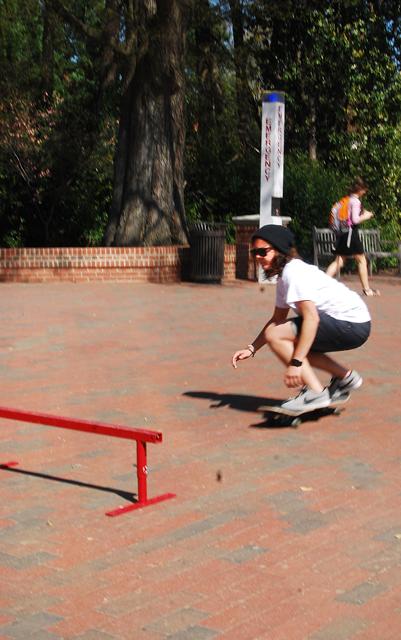As the weather turns warm, Campus Police officials say they see a noticeable increase in skateboarders.
Skating has become so popular at the University that some students have formed N.C. Skate, the official University skate club. Skating is very popular, but it can also be very dangerous.
To mitigate the risk to skaters and pedestrians, Campus Police has been working with N.C. Skate since last spring to ensure everyone skating on campus remains safe. According to campus officials, safe skating by students is permitted anywhere on campus.
“Students are permitted to use it as a mode of transportation. As long as there is no damage to University property, it’s OK,” Officer Amy Wilson, with crime prevention, said.
To help keep campus safe, Campus Police officials drew up an agreement with N.C. Skate on July 14. The agreement states skateboarders are allowed to skate in the “flat spot” located outside of the Free Expression Tunnel, as long as they are only doing “flat-ground” tricks and are aware of pedestrian traffic. Flat ground tricks are tricks a skateboarder can perform on a flat surface without any obstacles such as ramps or half-pipes.
“We made this policy because we wanted to have something specific to go by when dealing with skateboarders on campus. It’s pretty rare to see problems with it,” Wilson said.
Matt Olszewski, a sophomore in wood products and a member of N.C. Skate, said the policy is helpful. Members of the club were given a printed copy of the policy to carry around and show to Campus Police if officers ever stopped them for skating.
“It definitely reduces problems. For the most part, we’re skating in a concentrated area,” Olszewski said. ”We don’t want to cause any problems, we just want to skate.”
Wilson said not all of the University’s issues with skating are the fault of students. Non-students who skate on campus can be charged with trespassing and have their skateboards confiscated if they are caught not following campus policies.
“Kids around Raleigh know this is a spot to skate, and they come here all the time,” Olszewski said.
Usually people get a warning before their skateboards are confiscated or they are charged for trespassing, Wilson said. Officially documented violations are usually reserved for second-time offenders.
“We really don’t have a major problem with it. The warmer weather is bringing some more people out, but it hasn’t caused any big issues,” Wilson said.
The non-students who skate on campus cause problems for the Skate Club, according to Zach Vile, a freshman in First Year College and member of the club. He said he likes skating with all types of people, but sometimes non-students cause trouble by leaving trash outside and being disorderly.
“It’s bad for the club and good for the sport. Skating is all about unity, but sometimes they make us look bad,” Vile said.
Campus Police officers sometimes catch people who are not students by randomly checking for student IDs. Vile said people who do not have ID cards usually just leave campus willingly whenever this happens.
“They have just as much of a right to skate a spot as we do as students,” Vile said.
Despite the problems Campus Police have had to deal with in the past, Wilson said skateboarding generally does not cause any major problems for the University, as long as skaters do not destroy University property and pedestrians remain safe.
When it comes to dealing with Campus Police, Vile said skaters are typically treated with respect.
“Campus Police has been pretty fair. It could be a lot worse than it is,” Vile said.








